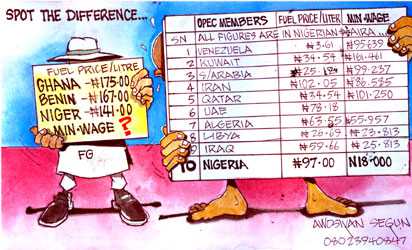 BY Emma Ujah Abuja Bureau Chief
BY Emma Ujah Abuja Bureau Chief
Agitators who expect the administration of President Goodluck Ebele Jonathan to reduce the prices of petroleum products may be disappointed, as investigations have shown that it is not currently being considered.
It was learnt that the considerations of the federal government is that what should have been a direct benefit to consumers as a fall-out from the crash in the prices of crude oil in the international market has been lost to the devaluation of the Naira.
The Central Bank recently devalued the Naira from a long-standing N155==$ 1 to N168==$1, owing to pressures on the currency at the foreign Exchange market.
The Petroleum Products Pricing regulatory Agency, PPPRA, claimed in its Thursday, December 11, 2014, that it was buying products from foreign refineries at the rate of N171.36 ==$1.cartoon-fuel2
PPPRA’s Pricing Template indicated that as at Thursday, its Offshore Nigeria Price stood N78.67 per litre and a Landing cost of N88.90 per litre.
When all distribution margins and other costs are added to the landing cost, Expected Open Market Price got to N104.39 per litre, thus still leaving the federal government with a subsidy of N7.39 kobo.
State actors claimed that the federal government now needed much more Naira to buy the products which should have cost consumer more but for the reduction in the cost of crude , as well as, subsidy it pays on the products.
Brent prices have fallen to about $ 70 per barrel, with industry experts forecasting further fall to as low as $ 50 per barrel in the months ahead. Products prices across several countries around the globe have been cut by marketers in countries like the United Kingdom where the prices have been deregulated. In that country, ASDA, Tesco, Morrisons and Sainsburry have reduced petrol prices by at least 2 per litre, bringing prices around 112 . 7 per litre.
Malaysia, India, Indonesia and Sri Lanka also officially cut their petroleum products’ prices, some by as much as 6 per cent. The federal government while responding to the development in the international crude oil market has cut 2015 subsidy budget to about N 458.68 billion, down from N 971.14 billion in the current Fiscal Year. It has also reviewed downwards it oil price benchmark twice to avoid being caught napping in the crashing oil prices scenario.
It originally proposed $78 per barrel of oil for the 2015 budget, but later revised to $73 per barrel and lately $65 per barrel. Agitation for the a cut in prices of petroleum products have been mounting with Governor Babatunde Fashola of Lagos State, last week, criticizing the federal government over its reluctance towards reducing the pump price of oil from the current N97 per litre, after a significant decline in crude prices.
The Governor spoke while addressing hundreds of youths at the Lagos State After School Graduation Development Centre, AGDC, IGNITE Employability Project 5, Ikeja. His words, “Now, we should be enjoying cheap fuel if the price of oil has dropped globally. And even as we import the product, a major component has reduced in price. While this has reduced, the pump price of fuel in the country still remains the same. Something is wrong.
“If the price increases in the country when the price of oil goes up globally, then it should also reduce when the price of crude oil drops.
“I am not an economist but I have some logic and common sense to ask critical questions. For instance, if one buys flour at N10 per kilogram, and the bread is sold at N1 per loaf, if the price of flour drops, the price of the bread should also change”.
The Nigeria Labour Congress, NLC, has also joined the agitation by calling on the federal government to reduce pump prices of petroleum products in line with falling crude prices in the international market as has been done by other countries.
General Secretary of NLC, Dr Peter Oso-Eson, told journalists midweek that NLC was worried prices of products have remained static. According to him, ”The area that worries us very seriously is that crude prices are falling. In order countries, what that is immediately translating to, is that the price of petroleum products and pump head is coming down. In the United States, in the last one month, the price of a gallon of petrol, has come down from $3 to $2, in response to this price adjustment. In our country, we are not allowed to enjoy that benefit.
What government is doing is that in order to shore up its naira revenue, it has gone to devalue excessively, the naira; $13 devaluation in one day, and then a continuous process of depreciation. “What that does, is that, because we import petroleum products largely, the gains from the falling price of crude which ought to translate to consumers, is prevented by that devaluation; because, by devaluing the cost of the head price, it might even increase.
”We say that that is wrong and the benefits of the falling price of crude, must be translated to Nigerians. Therefore, going forward, we want a situation in which the pump of petrol and other petroleum products should actually be adjusted downwards.”



























